人教版-英语-八上-人教新目标八下 1单元 课件
合集下载
人教版八年级英语下册Unit 1全单元教学课件(共115张PPT)
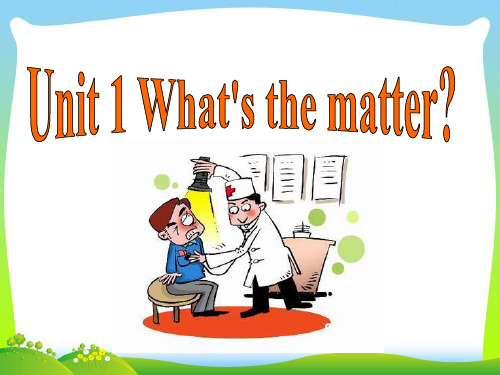
2a Listen and number the pictures
[1-5] in the order you hear them.
2
4
3
1
5
2b Listen again. Match the
problems with the
1 fevaerdvice.
a lie down and rest
2 stomachache
13、He who seize the right moment, is the right man.谁把握机遇,谁就心想事成。2021/7/282021/7/282021/7/282021/7/287/28/2021
14、谁要是自己还没有发展培养和教育好,他就不能发展培养和教育别人。2021年7月28日星期三2021/7/282021/7/282021/7/28
Conversation 5 Betty: What’s the matter, Judy?
Ann: She _h__a_s_a__so_r_e__t_h_r_o_a_t.
1c Look at the picture. What are the students’ problems? Make conversations.
She didn’t take care of herself on the weekend. She was playing with her friends at the park yesterday. Then it got windy, but she didn’t put on her jacket. Now she has a cold.
break
n. 间歇;休息
hurt (hurt) v. (使)疼痛;受伤
人教版新目标初二英语八年级下册Unit 1 What's the matter Section A(1a-2d)PPT课件
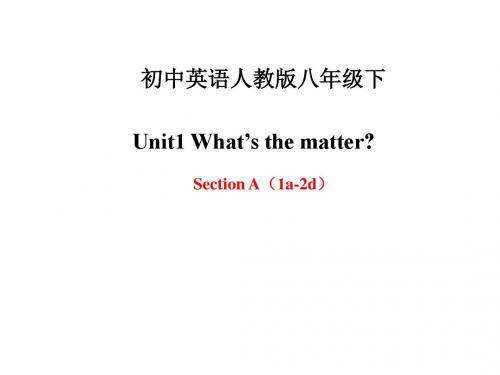
He hurt himself.
She hurt herself.
He has a stomachache.
She has a stomachache.
He has a cough.
She has a cough.
He has a headache.
She has a headache.
Pair Work
2
4
3
1
5
2b
Listen again. Match the problems with the advice.
1.fever
a. lie down and rest
2.sore throat
3.stomachache 4.toothache 5.cut myself
b. drink some hot tea with honey
g ___arm h ___back e ___ear ___eye i
b a ___foot ___hand
l ___leg ___mouth c
j ____head d ____neck
k m f ___nose ___stomach ____tooth
1b
Listen and look at the picture. Then number the names [1-5].
Look and say What’s the matter with him/her…?
He has a toothache. She has a toothache.Biblioteka He has a fever.
She has a fever.
He has a sore throat.
人教版八年级英语下册Unit1_SectionB(2a-2e)名师课件
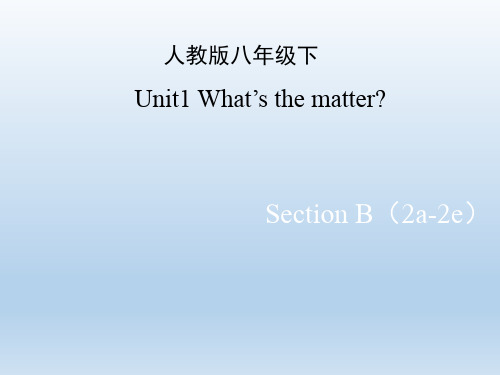
mind taking risks.
__5__ Aron did not give up after the accident
and keeps on cliБайду номын сангаасbing mountains today.
__4__ He wrote a book about his experience. __3__ Aron lost half his right arm from the 2003 accident.
• On the day, Aron’s arm was caught under a 2000-kilo rock that fell on him when he was climbing by himself… After that, he climbed down the mountain to find help.
Accidents or problems
fall down
hurt our back or arm
get sunburned
hit by a ball
cut ourselves
mountain climbing have problems breathing
2a
Accidents or problems can sometimes happen when we do sports. Write the letter of each sport next to
冒险 n. (交通)事故;意外遭遇
Words and expressions
situation kilo rock
run out (of) knife
cut off blood mean get out of
__5__ Aron did not give up after the accident
and keeps on cliБайду номын сангаасbing mountains today.
__4__ He wrote a book about his experience. __3__ Aron lost half his right arm from the 2003 accident.
• On the day, Aron’s arm was caught under a 2000-kilo rock that fell on him when he was climbing by himself… After that, he climbed down the mountain to find help.
Accidents or problems
fall down
hurt our back or arm
get sunburned
hit by a ball
cut ourselves
mountain climbing have problems breathing
2a
Accidents or problems can sometimes happen when we do sports. Write the letter of each sport next to
冒险 n. (交通)事故;意外遭遇
Words and expressions
situation kilo rock
run out (of) knife
cut off blood mean get out of
Units 1---5 复习( 课件)-2024-2025学年人教版英语八年级
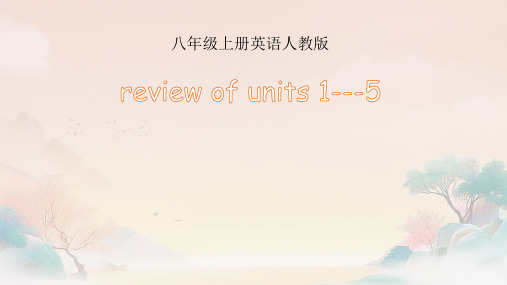
八年级上册英语人教版
Review the words of unit 1
任务一:我指你说
anyone
everyone someone bird
umbrella
anywhere of course diary
bicycle wet
wonderful myself enjoyable building because of
戏院;剧场 (n.) 使人舒服的;舒适的 (adj.) 座位;坐处(如椅子等) (n.) 银幕;屏幕 (n.) (在空间、时间上)接近 (adj.) 票;入场券 (n.)
worst 最差(的);最坏(的);最糟(的) (adj.& adv.) cheaply 便宜地;低廉地 (adv.)
song 歌;歌曲 (n.) choose 选择;挑选 (v.) carefully 细致地;小心地;谨慎地 (adv.) reporter 记者 (n.)
few
yourself activity trader
below
quite a few hen
decide
wonder enough
most
pig
try
difference hungry
something seem
paragliding top
as
noting
bored feel like wait
hill
review the grammar 一、一般过去时
一.概念:表示过去发生的动作,常与过去状语连用。 for example:yesterday, the day before yesterday,last week,three days ago,just now
Review the words of unit 1
任务一:我指你说
anyone
everyone someone bird
umbrella
anywhere of course diary
bicycle wet
wonderful myself enjoyable building because of
戏院;剧场 (n.) 使人舒服的;舒适的 (adj.) 座位;坐处(如椅子等) (n.) 银幕;屏幕 (n.) (在空间、时间上)接近 (adj.) 票;入场券 (n.)
worst 最差(的);最坏(的);最糟(的) (adj.& adv.) cheaply 便宜地;低廉地 (adv.)
song 歌;歌曲 (n.) choose 选择;挑选 (v.) carefully 细致地;小心地;谨慎地 (adv.) reporter 记者 (n.)
few
yourself activity trader
below
quite a few hen
decide
wonder enough
most
pig
try
difference hungry
something seem
paragliding top
as
noting
bored feel like wait
hill
review the grammar 一、一般过去时
一.概念:表示过去发生的动作,常与过去状语连用。 for example:yesterday, the day before yesterday,last week,three days ago,just now
人教版八年级英语下册教学PPT课件Unit1第一课时(Section A 1a-2d)
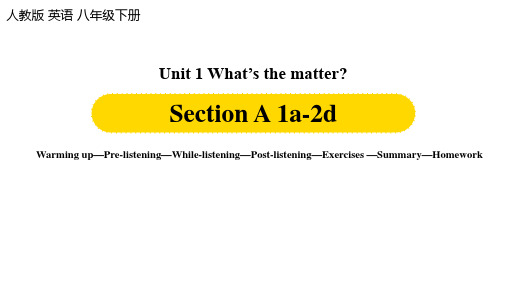
Nancy: has a toothache
Sarah: has a cold
Ben: has a sore back
David: got a stomachache last night
Judy: has a very sore throat
While-listening
Listen again and fill in the blanks.
Nancy____ Sarah ____ David ____ Ben ____ Judy ____
While-listening
1b Listen and look at the picture. Then number the names[1-5].
Nancy___3__ Ben ___5__
This is my... These are my...
Pre-listening
1a Look at the picture. Write the correct letter[a-m] for each part of the body.
__h___ arm __e___ back __g___ ear __i___ eye __b___ foot ___a__ hand __j___ head __l___ leg __c___ mouth ___d__ neck __m___ nose ___k__ stomach __f___ tooth
last night
birthday party.
has a sore back __h_u_r_t __ _h_im__s_el_f_when playing soccer.
Nancy has a toothache
Sarah: has a cold
Ben: has a sore back
David: got a stomachache last night
Judy: has a very sore throat
While-listening
Listen again and fill in the blanks.
Nancy____ Sarah ____ David ____ Ben ____ Judy ____
While-listening
1b Listen and look at the picture. Then number the names[1-5].
Nancy___3__ Ben ___5__
This is my... These are my...
Pre-listening
1a Look at the picture. Write the correct letter[a-m] for each part of the body.
__h___ arm __e___ back __g___ ear __i___ eye __b___ foot ___a__ hand __j___ head __l___ leg __c___ mouth ___d__ neck __m___ nose ___k__ stomach __f___ tooth
last night
birthday party.
has a sore back __h_u_r_t __ _h_im__s_el_f_when playing soccer.
Nancy has a toothache
八年级上册英语Unit1单元课件(人教版)

八年级上册英语
Unit 1教案
Where did you go on vacation?
Section A Period 1 (1a-2d)
Where did you go on vacation?
went to the mountains
Where did you go on vacation?
3a Fill in the blanks with the words in the box and practice the conversation.
Linda: Did you do _a_n_y_th__in_g_ fun on
your vacation, Alice?
anyone
Alice: Yes, I did. I went to Sanya. something
clean play visit study have go
cleaned played visited studied had went
stay
stayed
watch
watched
practice practiced
do
did
am / is was
1b Listen and number the people in the picture [1-5].
Where did you go on vacation?
visited museums
Where did you go on vacation?
went to summer camp
1a Match the activities with the pictures [a-g].
Where did you go
Unit 1教案
Where did you go on vacation?
Section A Period 1 (1a-2d)
Where did you go on vacation?
went to the mountains
Where did you go on vacation?
3a Fill in the blanks with the words in the box and practice the conversation.
Linda: Did you do _a_n_y_th__in_g_ fun on
your vacation, Alice?
anyone
Alice: Yes, I did. I went to Sanya. something
clean play visit study have go
cleaned played visited studied had went
stay
stayed
watch
watched
practice practiced
do
did
am / is was
1b Listen and number the people in the picture [1-5].
Where did you go on vacation?
visited museums
Where did you go on vacation?
went to summer camp
1a Match the activities with the pictures [a-g].
Where did you go
初中英语人教版八年级上册Unit 1 .-阅读课件
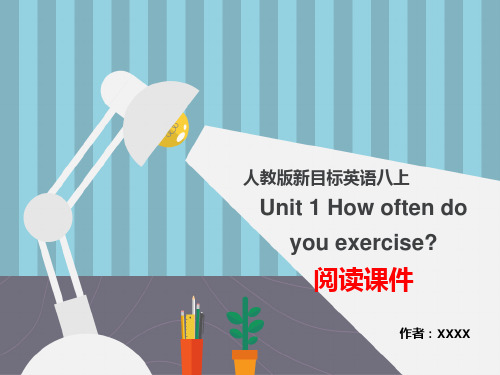
现方式做保护处理对用户上传分享的文档内容本身不做任何修改或编辑并不能对任何下载内容负责
人教版新目标英语八上
Unit 1 How often do you exercise?
阅读课件
作者:XXXX
The good habits of English study
Jane is a 16-year-old high school student in the United States. American Teenager magazine asked her about her habits. Jane has a lot of good habits. She always exercises and she reads day Also, she _______ books every _______. often drinks juice ever and she hardly _______ stays up late. However, she has usually watches TV some bad habits, too. She _______ for more than two hours a day, and she _______ sometimes eats hamburgers. Her parents are not very hardly ever happy because she __________ helps with housework and she never _______ goes to the dentist 水 for teeth cleaning. She says she is afraid.
水
Free talk: Talk about your habits.
人教版新目标英语八上
Unit 1 How often do you exercise?
阅读课件
作者:XXXX
The good habits of English study
Jane is a 16-year-old high school student in the United States. American Teenager magazine asked her about her habits. Jane has a lot of good habits. She always exercises and she reads day Also, she _______ books every _______. often drinks juice ever and she hardly _______ stays up late. However, she has usually watches TV some bad habits, too. She _______ for more than two hours a day, and she _______ sometimes eats hamburgers. Her parents are not very hardly ever happy because she __________ helps with housework and she never _______ goes to the dentist 水 for teeth cleaning. She says she is afraid.
水
Free talk: Talk about your habits.
人教版英语八年级上Unit1整单元课件(共192张)
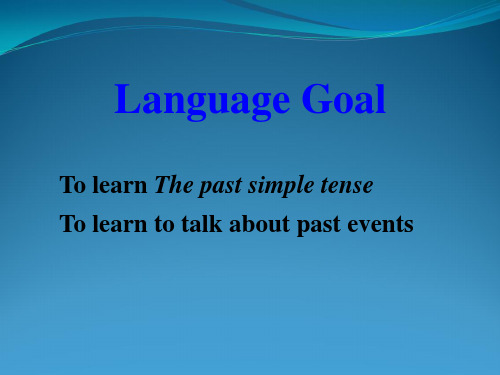
2)如果动词是延续性动词,则一般它即可 表示动作,也可以表示状态。 如:live/stay/work等就是此类。 3)如果是单独的瞬间性动词,则它只表示 动作。 如:get up/put on/begin就属于此类。
5. Did you buy anything special? 在英语中,anything, something, nothing 和everything是用于指代事物的复合不定代 词,与之相对应的复合不定代词 anyone, someone, no one 和everyone ( anybody, somebody, nobody 和 everybody) 用于指人。
happy.
2d Role-play the conversation. Rick: Hi, Helen. Long time no see. Helen: Hi, Rick. Yes, I was on
vacation last month. Rick: Oh, did you go anywhere
4. I was on vacation last month. be on vacation 译为 “在度假” 强调状态。 而 “go to vacation”, 去度假。 强调动作。 我们应该如何区分英语中强调动作和状态 的词语: 1)一般来说,单独的动词/短语一般强调动 作;而如果“be + 分词/形容词”则只表状态 。如marry sb和get married to sb表动作,而 be married to sb表状态。
She visited the USA. She went to New York City.
Where did they go on vacation?
They went to summer camp. /kæmp/
- 1、下载文档前请自行甄别文档内容的完整性,平台不提供额外的编辑、内容补充、找答案等附加服务。
- 2、"仅部分预览"的文档,不可在线预览部分如存在完整性等问题,可反馈申请退款(可完整预览的文档不适用该条件!)。
- 3、如文档侵犯您的权益,请联系客服反馈,我们会尽快为您处理(人工客服工作时间:9:00-18:30)。
缩略形式:’ll
will 常用于第二、三人称, 但在口语中各种人 称都可以用will。 will
否定式:will not = won’t
时态:一般将来时
The Simple Future Tense
4、基本句型:
肯定句:
主语 + shall / will +v.原形
否定句:
主语 + shall / will +not + v.原形
next week 下周
next month 下个月
next year 明天
before 不久
soon 不久
the day after tomorrow 后天
the year after next 后年
the week after next 下下周
时态:一般将来时 The Simple Future Tense
Will people have robots in their homes?
A: Do you think there will be robots in people’s homes? B: Yes, there will. I think every home will have a robot. A: Will kids go to school? B: No, kids won’t go to school. They will study at home on computers. …
2a Listen and circle the words you hear.
1. There will be more/less/fewer people. 2. There will be more/less/fewer free time. 3. There will be more/less/fewer cars. 4. There will be more/less/fewer pollution. 5. There will be more/less/fewer trees.
④ You ought to smoke _f_e_w__e_r cigarettes and drink _l_e_s_s_ beer .
2b Listen again. Check the predictions you hear.
_____ 1. There will be fewer people. _____ 2. There will be less free time. _____ 3. People will use the subways less. _____ 4. There will be more pollution. _____ 5. Cities will be very big and crowded.
2c Group work
Change the predictions into questions and ask each other these questions.
A: I think there will be fewer people. B: Well, I don’t agree. But I think there will be
What will you be in 10 years? I’ll be an engineer.
What will you be in 10 years? I’ll be a teacher.
What will you be in 10 years? I’ll be an actor.
A:What will you be in 10 years? B:I will be a …. A:Where will you work? B:I will work in ….
6、练习翻译:
⑴ 明天,Jim就15岁了。 Jim will be fifteen years old tomorrow. ⑵明天我爷爷不会去钓鱼。
My grandfather won’t go fishing tomorrow. ⑶你下个月将会来合肥吗?
Will you come to Hefei next month? ⑷我们什么时候再见面? When shall we meet again?
Make dialogues of 1a.
1b Listen and circle the predictions you hear
in activity 1a.
___A___D 1.People will have robots in their homes. ___A___D 2.People won’t use money. Everything will be free. ___A___D 3.Books will only be on computer, not on paper. ___A___D 4.Kids won’t go to school. They’ll study at home on
一般疑问句: shall / will +主语 + v原形
特殊疑问句: 特殊疑问词 + 一般疑问句
简略回答:
Yes, I shall. / Yes, I will. No, I shan’t. / No, I won’t.
时态:一般将来时
The Simple Future Tense
5、特色词:
tomorrow 明天
试做以下试题:
① I earn __l_e_s_s_ money than my sister. ② There are _f_e_w__e_r cars parking outside today than yesterday.
③ We have _f_e_w__e_r students this year than last year.
coffee
few
fewer更少的(修饰可数名词)(fewest最少的)
一些(否定)
cars, trees, buildings, people, computers, astronauts, robots, times (次数)
fewer & less
相同点: 这两个词后都是比较级, 均可表示“较少的”。 不同点: ⒈ fewer是few的比较级, 只能修饰可数名词的复数。 ⒉ less是little的比较级, 只能修饰不可数名词的复数。
more people. A: I a talking about the earth in the future, in 100 years.
Tom: Will there be more people? Mary: No, there won’t. There will be fewer people. Tom: Will there be more pollution? Mary: No, there won’t. There will be less pollution, because there will be more trees.
What do you think he / she will be in five years?
What sport will he / she play?
What will he / she have?
I think he / she will be
.
3a Look at the pictures of Sally. Then fill in the blanks in the sentences.
Talk about it with your partner.
时态:一般将来时
The Simple Future Tense
1、概念: ⑴表示将要发生的动作或存在的状态。
我们明天去看他。 We shall go to see him tomorrow. ⑵表示将来经常或反复发生的动作。 从现在起我将每天来。
What will you be in 10 years? I’ll be a computer programmer.
What will you be in 10 years? I’ll be a basketball player.
What will you be in 10 years? I’ll be an airline pilot.
From now on I shall come every day.
2、结构: 助动词 shall / will + v.原形
时态:一般将来时
The Simple Future Tense
3、 shall与will的区别:
shall
shall常用于第一人称。 否定式:shall not = shan’t
What can you see in this picture?
There will be… 将会有……
There will be more people. There will be fewer trees. There will be more pollution. There will be more buildings. There will be more cars. There will be less fresh air.
1. Five years ago, Sally was__in__h_i_g_h_s_c_h_o_o_l___. 2. She played_s_o_c_c_e_r__. 3. She had__a__c_a_t __.
4. Today, Sally is___i_n_c_o_l_le_g_e___. 5. She plays_t_h_e__g_u_it_a_r____. 6. She has___a_d__o_g__.
